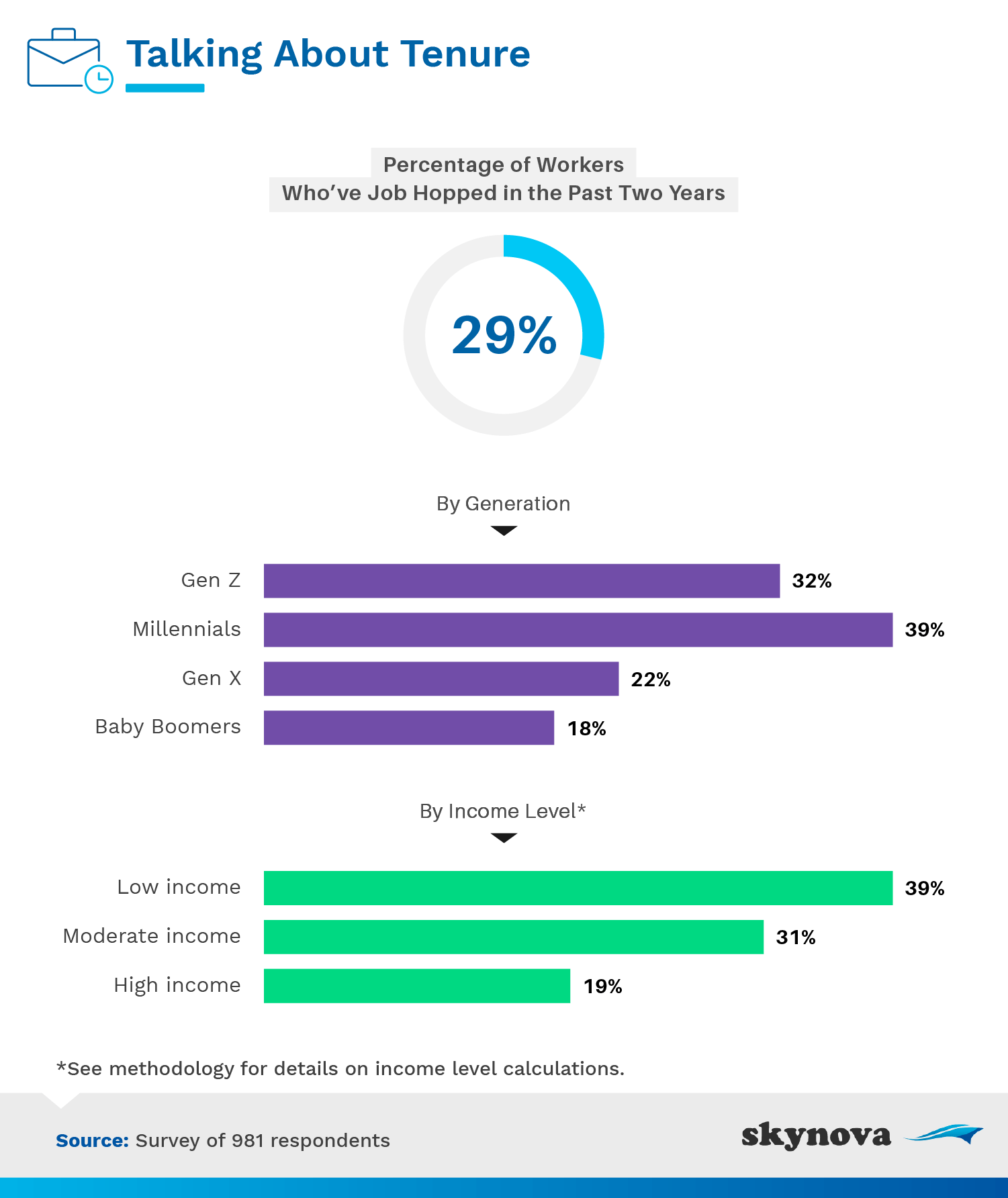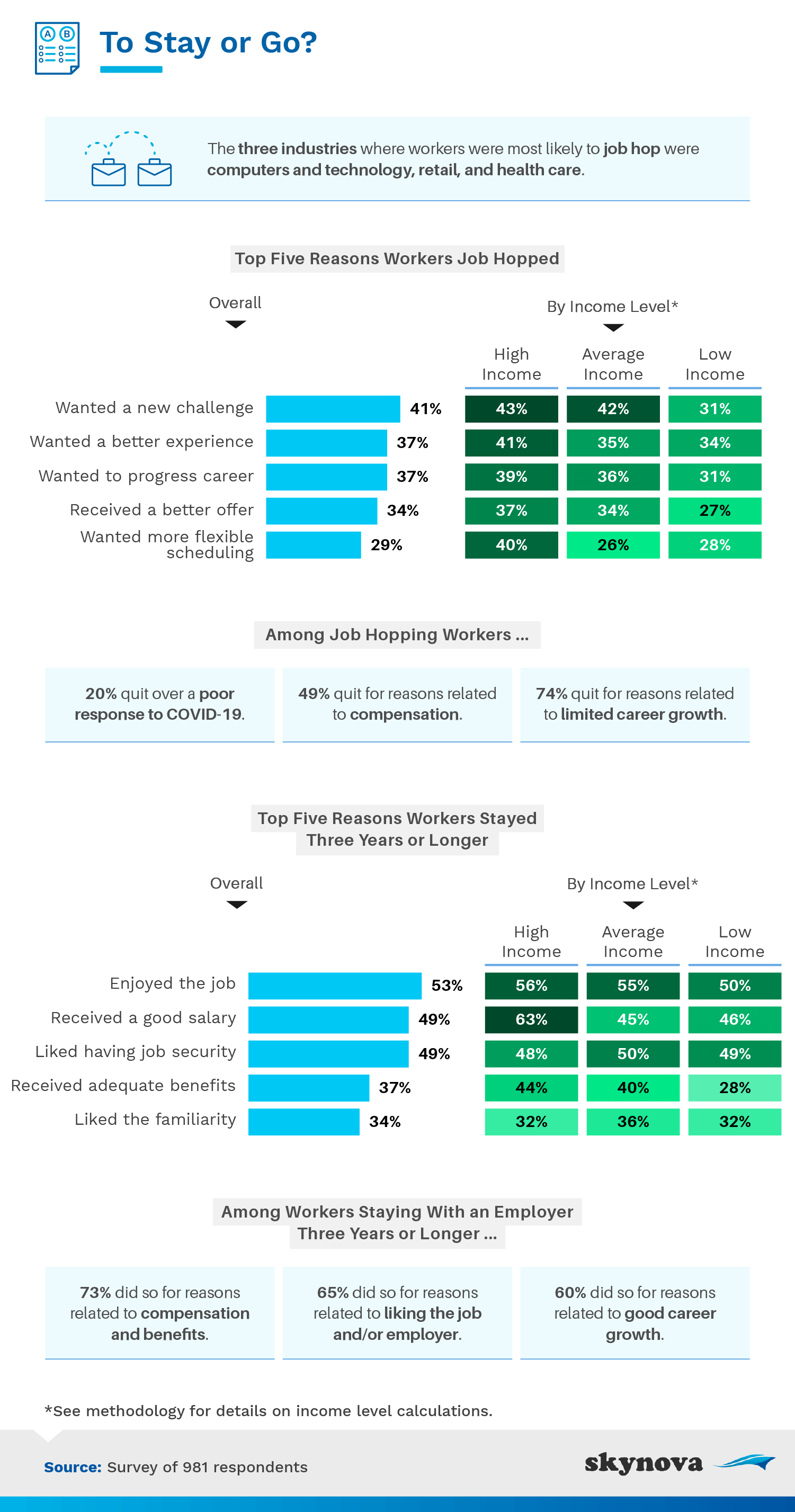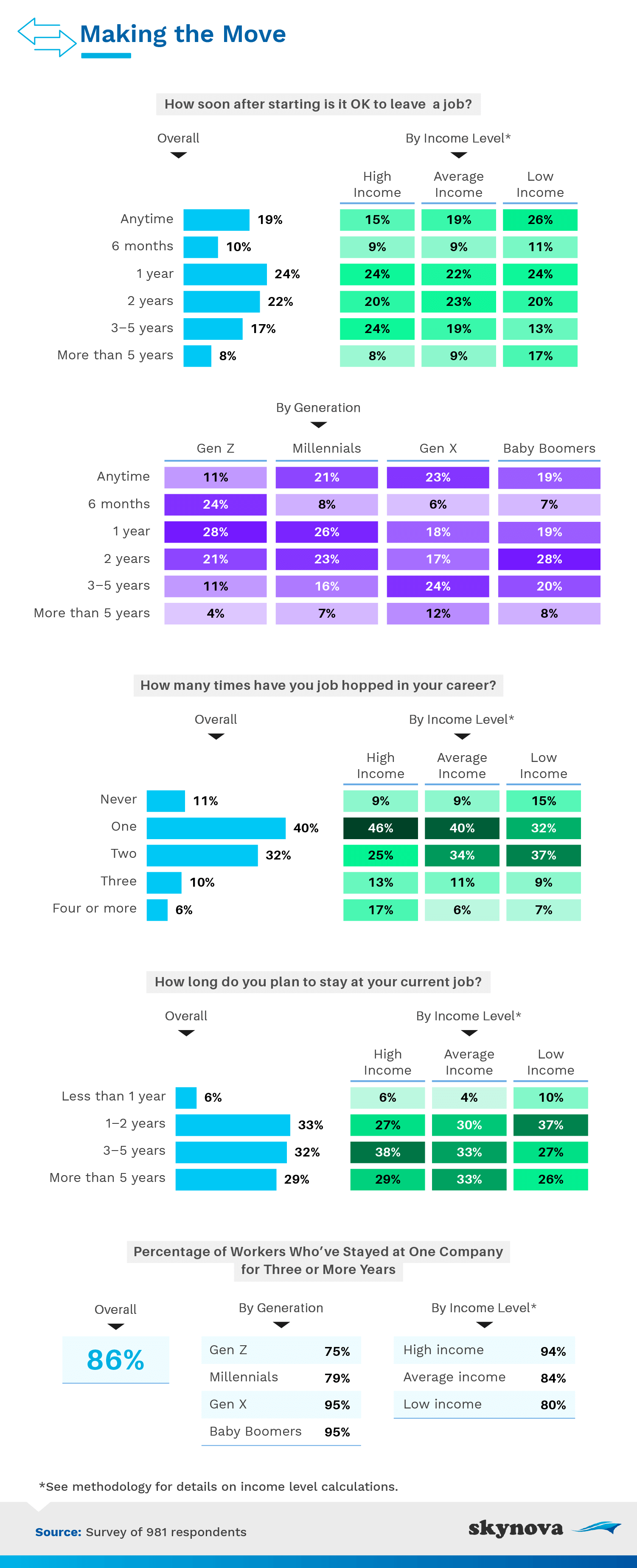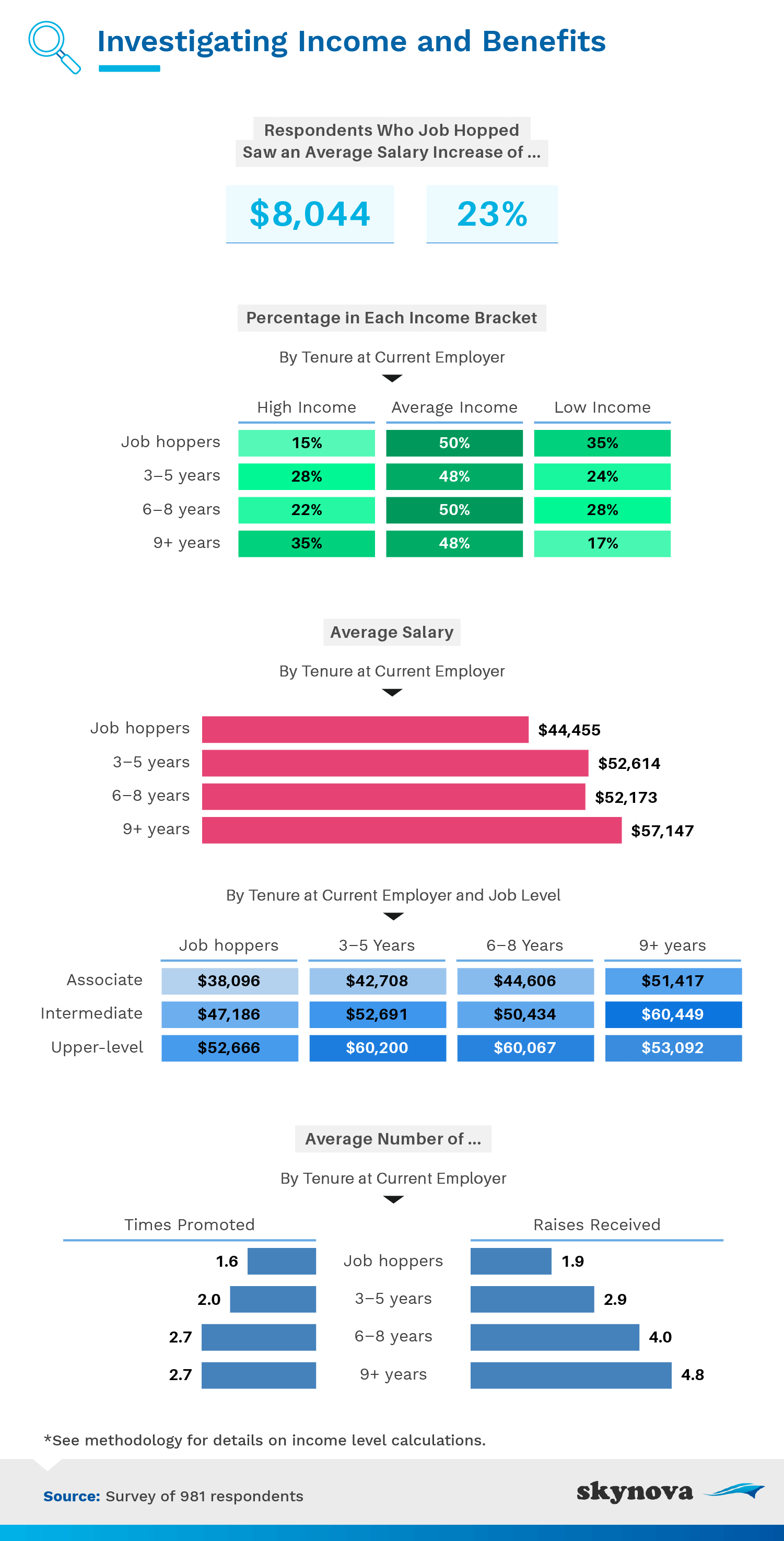
|
To stay or go? That is the question that countless Americans face on a daily basis in regards to their careers. To learn more about this tough decision, we queried almost 1,000 employed Americans with varying tenures at their current companies.
They were asked to share the reasons why they decided to stick it out with a given employer for a while, or on the other hand, what prompted them to ditch their post. We'll also see when they think is the appropriate time to call it quits at a company and how their wages might vary depending on how long they've stayed. Stay tuned to find out.
While some prefer to grow at a company, others find staying too long can be restrictive. Looking at tendencies throughout different generations and income levels, let's see who's up and out of their companies in two years or less.

Twenty-nine percent of respondents could be classified as job-hoppers, having switched jobs in the past two years for one reason or another. Among them, millennials were the most likely to jump ship early on with Gen Zers not too far behind. Baby boomers seemed to be most loyal to their companies or craft, as only 18% of them had recently job-hopped.
Contrary to older workers, who are typically more established in their career, young people are often much more open to taking risks and finding the right professional fit before settling down somewhere for the long haul. Now, in the wake of the pandemic and the upheaval it has caused in the job industry, younger generations are especially interested in job mobility and schedule flexibility – they'll happily test the market until they find a job that fits their increasingly complex work-life balance needs.
By income level, the lower the wage, the more likely it was that respondents had job-hopped in the last two years. Naturally, people in higher paying positions were not as inclined to look for work elsewhere.
Let's assess why some people decide to pursue a long-term career in the same place, while others look for an exit. The top five reasons for both sides of the argument are revealed and discussed below.

Some companies deal with higher employee turnover than others and none more so than those in the computer and technology, retail, and health care sectors. On the other hand, results showed that advertising and marketing, hospitality, and agriculture-related companies tend to keep their employees longer than anyone else. For example, housekeeping employees working for hotel company Hyatt stick around, on average, for 12 years. Hyatt's high-quality training programs, support for workforce diversity, and commitment to involving employees in conflict resolution strategies are all reasons employees might be tempted to stay a while.
So, what are some other reasons an employee might choose to stay at a given company? Quite simply, 53% of respondents said it was because they enjoyed the work they were doing. Attractive wages didn't hurt either – nearly half of employees cited good pay as their reason for staying put for three years or more. Aside from compensation, benefits, and liking their job/employer, many people kept their jobs for an extended period of time because they believed it would be beneficial for their career growth.
Sometimes, though, it's time to say goodbye a little earlier than expected. Over 40% of people attributed their exit before the two-year mark to the pursuit of a new challenge, a desire for a better work experience, or the need to increase chances for career progression. Meanwhile, a fifth decided to leave because they were unsatisfied with their company's response to the COVID-19 crisis.
It might not look great if you quit a job shortly after being onboarded, but just how long should you wait before it's appropriate to jump ship? Again, we found some interesting differences among generations and income levels.

Nearly a fourth of respondents thought it's acceptable to part ways after a year in a position, but 19% believed that it's OK to give your two-week notice whenever you feel like it. A majority of respondents (89%) said they've left at least one job before getting two years of experience under their belt, but many are looking for longevity when they find the right company – 62% planned on staying with their current employer for three or more years, and 29% planned on staying for more than five years.
Out of the 86% of people who'd stayed with a company for three or more years, those with a high income and who were a baby boomer or Gen Xer were most likely to have done so. Naturally, people making lots of money wouldn't necessarily be scrambling to find a new job, but what are some other benefits to working for a long time at one company? For one, you build yourself a reputation of dependability. It also allows for the development of strong work relationships and potential access to special benefits such as cumulative bonuses and increased job security.
Finally, let's talk about wages in relation to job tenure and employment level. How much do income and benefits fluctuate based on these factors?

Although there are benefits to sticking with one company, respondents who switched jobs within the last year enjoyed an average salary increase of 23%. Additionally, changing jobs can clearly be a positive experience aside from the monetary advantage. Taking on a new challenge allows you to keep yourself engaged in your work and develop other critical career skills, and job hunting is a great learning experience in itself.
Focusing specifically on income, half or nearly half of respondents found themselves within the average income bracket, regardless of tenure length. That being said, generally, the longer someone worked for one company, the higher their salary. The same logic applied for the number of promotions and raises people were likely to receive.
Job-hoppers valued flexibility highly and were particularly drawn to jobs where remote work and flexible hours were a part of the deal. Employees who have been at their current post for three or more years desired a healthy work culture, a strong sense of belonging, and retirement benefits above all else.
Of the 981 employees we surveyed, nearly one third has job-hopped in the past two years. That said, respondents who had been with their current employer for three to five years made the highest wages, compared to people who've been working their current jobs for more or less time than that. The main reason why people wanted to stick around was simply because they enjoyed doing their job, while workers who wanted a new challenge were the first to jump ship.
Regarding quitting, almost a quarter of our respondents believed it would only be acceptable to do so after putting in a full year at a company; although a fair few believed you should feel free to head out whenever you like. At the end of the day, though, money is a big deciding factor in most people's career choices, and pursuing a long-term career at one company typically leads to higher wages and an increased chance at promotions and raises.
All of Skynova's 37 online software modules work in tandem to help small businesses effectively organize and manage their operations. We also like to write articles about topics we, and hopefully you, enjoy reading about. They will almost always revolve around a business or workplace angle, tying in other aspects of society too. We use both primary and secondary data to produce our content.
We surveyed 981 working Americans using the Amazon Mechanical Turk platform. Among those respondents, 562 were men, 417 were women, and two identified as nonbinary. Our average respondent was 38 years old, and respondents ranged in age from 18 to 70. To help ensure valid, accurate data, all respondents were required to identify and correctly respond to a hidden attention-check question.
In some cases, questions and answers have been paraphrased or rephrased for clarity and brevity. These data rely on self-reported information. Potential issues with self-reported data include, but are not limited to, the following: attribution errors, exaggeration, telescoping, and selective memory.
If you know someone who's been contemplating a career change, feel free to share these findings with them. We ask that you do so for noncommercial use only and to provide a link back to the original article for full access to our findings and methodology.